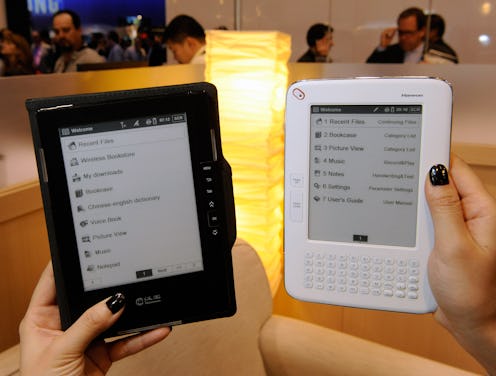Books
My E-Reader > Your Paperback

For several years in the '90s, I worked as a bookseller at a string of indie bookstores in Seattle. Since I had dreams of being an author, I romanticized the job of pushing paperbacks on defenseless customers in search of greater meaning. Each day, I inhaled the exhilarating scent of musty paper and bookbinder glue, pausing between bookshelf aisles to read passages from novels and memoirs with intriguing cover art. In the years that followed, I never lost my love of the paperback. I spent hours perusing used book stores searching for the $3 book from my to-read list or the book I never heard of that would surprise me. Then, one fated day, Christmas of 2008, my dad bought me a first-generation Kindle.
Although I considered the gift thoughtful, I was reluctant to use it. Why would I want to read on a screen? Didn’t I stare at a screen enough? Why would I want to give up the soft caress of the page, the scent of chemically washed bark, the fold of a gentle dog-ear? Months passed before I even turned it on to take a look. I was surprised to find that it wasn’t anything like a screen, but more like, well, paper — dark paper — with words given an added dimension as if they were floating off the page. Within the year, I was converted forever.
Here are four reasons why paper and I are never, ever getting back together:
1. Travel
While traversing the Baha peninsula, spending days lounging on beaches or hiking to waterfalls, living out of the back of my 12-foot camper with husband and baby, I had no room for chunky books. I needed something I could throw in my backpack and go that wouldn’t take up too much room. Not only that, but I read nearly a book a day on the road. I couldn’t haul multiple volumes around in my camper where I was already fighting for space with baby toys and man gadgets. I packed the Kindle instead. I stored all 20 books in that one package, small enough to fit in a purse. And when I couldn’t find books in English at the local bookstore, I wasn’t stuck without something to read.
2. Improved Vocabulary
This summer, I finally got around to reading The Adventures of Kavalier and Clay. Michael Chabon’s language is challenging, twisty, and fussy with thick figurative descriptions. I had to look up two to three words a page! I loved it, actually. If I had been reading him on paper, would I have skimmed over the big words and hoped that I got the idea in context? You bet your ass.
On the eReader, however, I simply touched the word, and it told me the definition. Even Yiddish phrases and historical references were easily accessible with the touch of the screen. It made my reading all the better for it and made me appreciate Chabon’s writing all the more.
3. Instant Gratification
I have to read that book — and I have to read it now! Has this ever come over you? A new book just came out, or one book I read urges me to read another, or I am working on a project that beckons me to a specific chapter in a specific book, or I’m on a reading binge. Only an eReader can give me that immediate fulfillment. Book in hand the moment I end the last one, ready to go so I never have to stop my reading marathon.
4. Fresh Air
Yes, there are downfalls. eBooks don’t make great birthday gifts. It’s difficult to skip ahead or skip forward if you want to look something up somewhere in the book. Sometimes you don’t have Wi-Fi. Sometimes the battery dies. But one reason trumps all of this: It saves trees, and that’s awesome. Because without trees, we’d die. Top that.
Image: Getty Images (2)